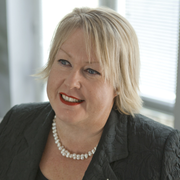Author: Dr. Wendy M. Purcell PhD FRSA, Harvard T.H. Chan School of Public Health, Harvard University
Goal advisor for a fairer society, and Series Editor for Emerald's 17-book series 'Higher Education and the Sustainable Development Goals'

Stewardship, a term we can trace back to the Anglo-Saxon 'stig ward' or 'keeper of the hall'[1], captures the idea of looking after something on behalf of others – being a custodian for current and future generations.
This sits comfortably with the concept of sustainable development, ably defined in Brundtland’s Report 'Our Common Future'[2] as 'development that meets the needs of the present without compromising the ability of future generations to meet their own needs'. A fairer society[3] relies on physical, societal and economic resources to be stewarded carefully from one generation to the next – so that assets relating to planet, people and prosperity are carried forward to be enjoyed by those that come after us.
However, it is already clear we are not being good stewards of human or Earth’s resources. For example, our activities are putting the planet’s biodiversity under threat, with plant and animal species disappearing at an alarming rate. The Global Biodiversity Outlook of the Convention on Biological Diversity[4] considers humanity is at a crossroads with regard to the legacy it leaves to future generations. Ever think that you might be the last person to see that fish, fly or flower? Perhaps, it’s that old saying of 'We don’t truly appreciate what we have until it’s gone'[5]. Are we simply taking our planet for granted? Looking at the climate crisis, largely caused by our current energy policy that burns fossil fuel in order to power our homes, transmit our vehicles, and so forth, then the answer is firmly 'Yes'.
The global climate crisis is not just about warmer or wetter days; rather it is a profound threat to human health[6], with under-resourced and vulnerable communities disproportionately affected. Extreme weather events, disruptions to food and water security, worsening air quality, the rise of vector-borne diseases, exacerbations of chronic disease, mental health stressors, and worker injury risks, are just some of the disruptions caused. The social determinants of health, from wealth to housing and race, can ameliorate or amplify climate impacts on health. Accompanying rising global temperatures, weather-related natural disasters include heat waves, severe storms, floods and drought, which have tripled over the last 50-years accounting for over 60,000 deaths per annum[7]. Heatwaves are associated with an increased rate of mortality and can lead to wildfires, causing death directly, with smoke adding to air pollution and illness. Extreme temperatures exacerbate drought, leading to dehydration and disturbing agricultural cycles, with impacts on food security and nutrition. Limited availability of clean drinking water contributes to outbreaks of diseases, such as cholera and other diarrheal illnesses, as well as conditions related to poor personal hygiene, and dry conditions can favour mosquito-borne diseases[8]. Environmental stewardship is, therefore, a shared responsibility to look after our planet to repair the ravages of environmental deterioration and sustain planetary health[9] for those here now and those to come.
However, when we look at stewardship it goes beyond natural resources and brings up key issues of fairness in society from how we govern our institutions, shape technology for the benefit of all, generate and manage wealth, and create inclusive educational opportunity, to mention just a few. For example, while Goal 4 'Quality Education' of the Sustainable Development Goals[10] reads 'to ensure inclusive and equitable quality education and promote lifelong learning opportunities for all' by 2030, the reality is not all but just 'those that live in nice areas'. This is because the zip code/postcode lottery is the biggest sweepstake of life – place can make or break us, or at least make it so much harder for some. For example, unequal access to education and supporting infrastructure leads to disparities in educational attainment – we get a grade 'F' for stewarding human potential. Enabling talent to be released into society is central to the pursuit of a fairer society. So too is access to technology. While we talk of a technological revolution, are the benefits available to everyone? The COVID-19 pandemic showed us how access to Wi-Fi and IT kit became a new frontier of inequity. Tech stewardship then relates to inclusive, accessible and sustainable technology.
Corporate stewardship is also important here as multinational organisations enjoy unparalleled scale and reach, operating across the globe and interacting with billions of customers and thousands of suppliers. As such, business has a responsibility to address some of the largest societal issues of our day. The Business Roundtable's revised 'Statement on the Purpose of a Corporation'[11] recognised this and redefined corporate purpose as serving society and all of its stakeholders – a radical departure from shareholder primacy. The World Economic Forum's Davos Manifesto 2020 also includes a similar list of goals and stakeholders that business must serve[12]. We could, therefore, be on the edge of the most remarkable prosperity and creativity in the history of the world, or at the mercy of corporations that are exacerbating the growing issues of inequality, poverty, and environmental degradation[13]. Bending the arc of justice towards the former, a fairer society is one that relies on a new societal contract with business.
We actually know how to be good stewards. Indigenous peoples and local communities are among the Earth's most important corporate stewardship 'keepers of the hall' and are critical to building a future where human needs are met in harmony with nature[14]. We see this in everything from land management and climate adaptation to indigenous architecture and medicines. If we are to address the threats posed by activities ranging from logging and mining to agriculture and urbanisation, we need local solutions where possible. Learning from the knowledge of Indigenous Peoples and safeguarding their rights as well as listening to communities will help us be worthy custodians.
The global Agenda 2030 seeks to create a world where 'no one will be left behind'[15]. This reflects both the fierce urgency of now as well as so-called 'cathedral thinking', i.e., taking the long view and pursuing an ambitious goal that might require several generations to complete, labouring in the present in service of the future[16]. The pursuit of a fairer society, therefore, relies on stewardship across a range of planetary and societal domains.
[8] Adapted from a forthcoming paper ‘Handling the Health Impacts of Extreme Climate Events.’ Leal Filho, W., Balasubramanian, M., Purcell, W.M. & Paz, S. (2022). Environmental Sciences Europe. Submitted December 2021; manuscript id SEU-D-21-00225.
[11] https://www.businessroundtable.org/business-roundtable-redefines-the-purpose-of-a-corporation-to-promote-an-economy-that-serves-all-americans
[12] https://www.weforum.org/agenda/2019/12/davos-manifesto-2020-the-universal-purpose-of-a-company-in-the-fourth-industrial-revolution/
[13] Mayer, C. Prosperity: Better Business Makes the Greater Good. Oxford University Press, Oxford, United Kingdom, 2018.
[14] https://files.worldwildlife.org/wwfcmsprod/files/Publication/file/1yw0d3jd5d_Engaging_the_Stewards_of_Nature_Partnering_with_Indigenous_Peoples_and_Local_Communities.pdf

Fairer society
We are passionate about working with researchers globally to deliver a fairer, more inclusive society. This perhaps has never been more important than in today’s divided world.
